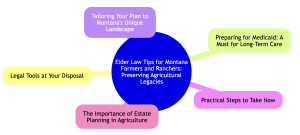
The Impact of Tax Changes on Estate Planning in Montana
March 19, 2024
Estate Planning: Is Inheritance Marital Property in Montana?
April 3, 2024Estate Planning for Farmers and Ranchers: Elder Law Tips

Montana Farmers and Ranchers Estate Planning
Introduction
Montana’s heartland is at a crossroads, with its aging farmers and ranchers facing the critical task of passing on their legacies (hopefully through well-prepared estate planning).
This article sheds light on the indispensable role of estate planning in safeguarding Montana’s agricultural heritage, ensuring that these treasures of land and livelihood are preserved for future generations.
Key Takeaways
- Medicaid planning is essential for protecting assets against long-term care costs.
- Strategic asset protection is necessary to safeguard your farm or ranch.
- Early and thorough planning ensures the survival and prosperity of your agricultural legacy.
- Utilizing trusts and legal structures can offer significant benefits.
- The advice of an elder law attorney is invaluable in navigating these complex waters.

The Importance of Estate Planning in Agriculture
Estate planning is a critical strategy for Montana’s agricultural community. It ensures that your farm or ranch can weather the uncertainties of tomorrow. The absence of an estate plan can lead to unintended consequences, potentially jeopardizing the future of your agricultural legacy.
Table: Impact of Estate Planning on Montana Farms and Ranches
| Aspect | With Estate Plan | Without Estate Plan |
| Legacy Preservation | High likelihood of continuity | Risk of fragmentation |
| Financial Sustainability | Enhanced | Compromised |
| Succession Clarity | Clear | Uncertain |
Strategies for Protecting Your Legacy: Estate Planning and More
Protecting your agricultural legacy requires a multifaceted approach. Here are two key strategies:
- Gifting: A proactive way to distribute assets while still alive, gifting can reduce estate taxes and ensure your legacy’s transition to the next generation.
- Trusts and Business Entity Formation: Trusts can protect your assets and provide for future generations while forming a business entity can offer tax advantages and simplify succession planning. (1)
Estate Planning Tools at Your Disposal
Estate planning in Montana offers a variety of legal tools to secure your agricultural legacy. Each option serves a unique purpose, catering to different needs and scenarios faced by farmers and ranchers.
- Wills: The cornerstone of estate planning, ensuring your assets are distributed according to your wishes.
- Trusts: Flexible tools for asset protection and estate tax reduction, with the added benefit of avoiding probate.
- Power of Attorney: Essential for managing your affairs should you become incapacitated, covering both financial and health care decisions.
- Succession Plans: Tailored strategies to smoothly transition your farm or ranch to the next generation.
Preparing for Medicaid: A Must for Long-Term Care
Securing Medicaid eligibility without compromising your assets is a delicate balance. It requires foresight and strategic planning.
- Understand the look-back period: Transfers made within five years of applying can affect eligibility.
- Asset protection: Use legal tools like trusts to safeguard your assets while adhering to Medicaid rules.
- Consult early: Engage with an elder law attorney well before care is needed to navigate the complexities of Medicaid planning.
- Regular reviews: Keep your estate plan updated to reflect changes in laws and your financial situation.
Tailoring Your Plan to Montana’s Unique Landscape
Montana’s expansive rural areas and rich agricultural heritage require a specialized approach to estate planning that takes into account the state’s distinct characteristics. The process goes beyond generic strategies, demanding a deep understanding of the local context to ensure that plans are both effective and reflective of Montana’s values.
State Laws and Regulations
Montana’s estate laws, for instance, offer unique exemptions and rates for estate taxes that could significantly impact how your estate is valued and taxed. One example is Montana’s approach to the valuation of agricultural land for estate tax purposes, emphasizing its use value rather than market value. This can lower the estate’s tax liability, making it crucial for estate owners to properly document and claim this valuation method. Additionally, Montana does not impose its own estate tax, unlike some states, which affects planning strategies.
The Rural Character of Farms and Ranches
Given the operational scale of Montana farms, integrating a succession plan that includes flexible leasing options or conservation easements can be beneficial. For instance, employing a conservation easement can protect your land from future development while providing tax benefits. This tool ensures that the land continues to be used for agriculture, preserving its character and your legacy.
Access to Resources
Montana’s Department of Agriculture offers programs like the “Montana Agricultural Legacy Plan” which provides templates and guidance for farm succession planning. Engaging with such resources can offer practical steps towards creating a robust estate plan. Additionally, consulting with legal experts through resources like Montana Elder Law or the Montana State University Extension can provide tailored advice that considers the latest state-specific legal and tax planning strategies.
Practical Steps to Take Now
Taking proactive steps is essential to ensure your estate planning aligns with your goals. Start by reviewing your current estate plan. This ensures it reflects your current wishes and the latest laws. Consulting with an attorney specializing in elder law and estate planning in Montana is crucial. They can provide tailored advice and strategies. Financial planning is another critical step. It ensures your assets are managed and distributed according to your wishes, with considerations for tax implications and long-term care needs.
Comparison of Actions for Estate Planning
Estate Plan Review
- Objective: Ensure documents are up-to-date and reflect current wishes.
- Frequency: At least every five years or after significant life events.
Consultation with an Attorney - Objective: Get professional advice tailored to your specific situation.
- Frequency: Initial planning and as laws or personal circumstances change.
Financial Planning - Objective: Manage assets to meet future needs and minimize taxes.
- Frequency: Ongoing, with annual reviews.
Conclusion: Estate Planning with Montana Elder Law
Estate planning is an ongoing process that requires attention to detail. The urgency of proactive planning cannot be overstated. It’s about more than distributing assets—it’s about leaving a legacy and ensuring your wishes are honored.
Montana Elder Law stands ready as your partner in this journey. With expertise in the unique challenges faced by Montana’s farmers and ranchers, they provide the guidance and support needed to navigate these complex waters confidently. Trust in their expertise to safeguard your agricultural legacy for future generations.
References:
(1) Wills – Trusts – Powers of Attorney – Estate Planning – Probate, Montana.gov, https://courts.mt.gov/forms/endoflife
